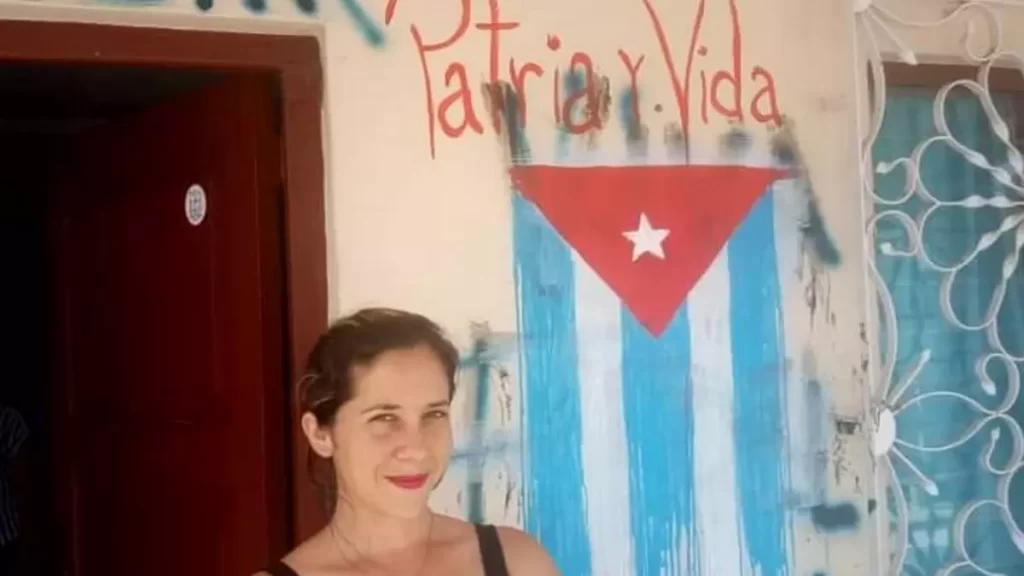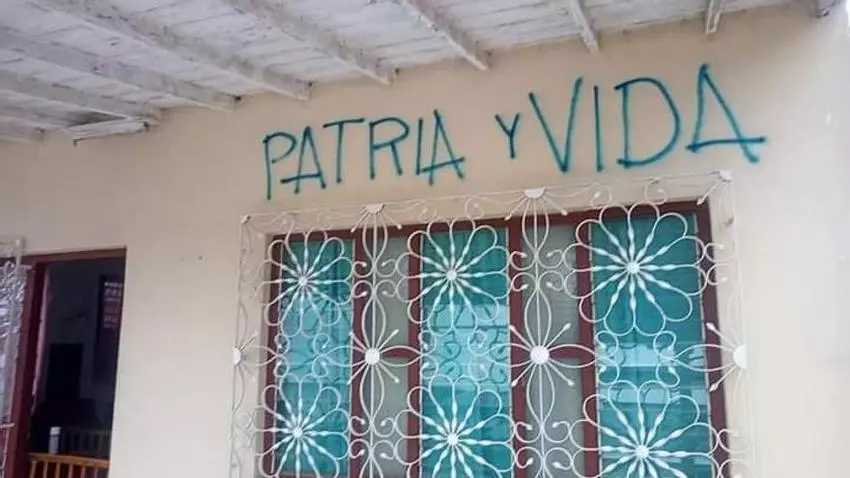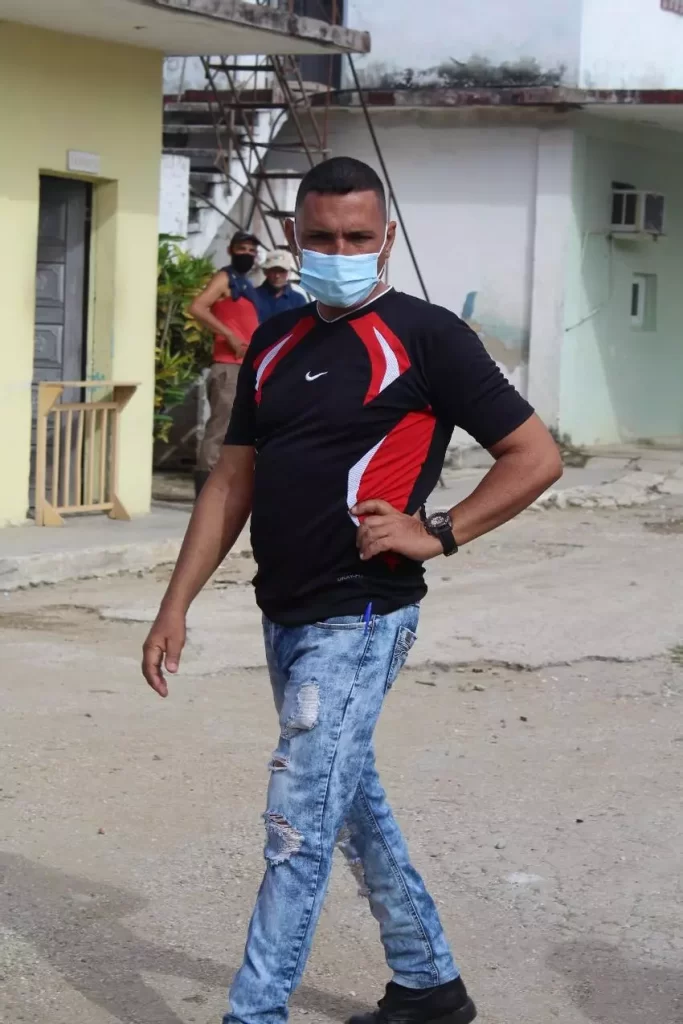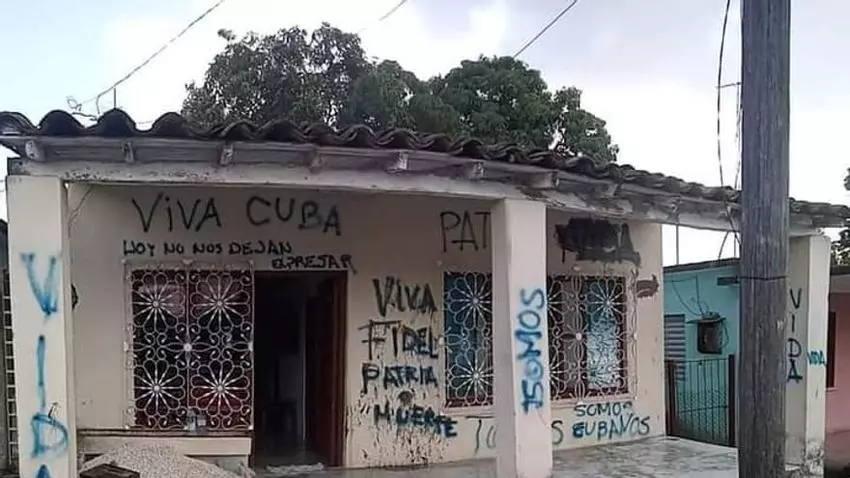
![]() 14ymedio, Havana, 23 April 2024 — Three words in blue ink – Patria y Vida… Homeland and Life – written on the facade of her house were enough for Sandra Hernández to understand State Security’s speedy response even in small towns like hers. After the island-wide protests of 11 July 2021 (11J), there was not a single gesture against the Government in the municipality of Cabaiguán, except hers. A few hours later, an act of repudiation and numerous slogans on her wall awaited her.
14ymedio, Havana, 23 April 2024 — Three words in blue ink – Patria y Vida… Homeland and Life – written on the facade of her house were enough for Sandra Hernández to understand State Security’s speedy response even in small towns like hers. After the island-wide protests of 11 July 2021 (11J), there was not a single gesture against the Government in the municipality of Cabaiguán, except hers. A few hours later, an act of repudiation and numerous slogans on her wall awaited her.
“That day, July 13, my husband and I decided to put ’Homeland and Life’ on the front of the house, because my daughter was barely one year old and I couldn’t go with her to the street to protest,” Hernández tells 14ymedio from the Dominican Republic, where she has been living for several months. “We painted the words around four in the afternoon on the facade of my building, supposedly inviolable before the law, although they didn’t care about that,” she says.
The graffiti, which alluded to the song of the same name and which became the anthem of the protests of 11J, marked a before and after in the life of Hernández and her family. “At night the president of the CDR (Committee for the Defense of the Revolution) arrived asking why I had written that and said we shouldn’t have done it in his CDR. He alluded to my deceased mother and grandmother, reminding me that they had been good revolutionaries, and told me that it was enemy propaganda,” she says.
When she finally thought that things would calm down, the family received another visit: “At 10 at night about 12 people arrived at my door. They were from the Federation of Cuban Women, the Union of Young Communists and other official organizations, saying that they wanted to ’converse’. I told them that that was not a good time to visit and that they could come back the next day.” The entourage left, says Hernández, but State Security did not stand idly by.
“In the early morning I was awakened by a strong chemical smell, similar to that given off by the Cabaiguán refinery. I realized that it was coming from the house itself, and I ran to open the kitchen door to ventilate,” she says. Before the family knew it, they had filled the front of the house with revolutionary slogans, and only the word “Homeland” remained. The strong smell came from the liquid asphalt that the regime’s agents had used – along with a blue paint – to scribble slogans and erase her sign.

“They used a blanket with chlorine that I had at the entrance for people to clean their shoes because of covid, and they painted with it. The substance they used, which is also toxic and flammable, is controlled by the State, and people aren’t supposed to use it. It’s made in the Cabaiguán refinery, and I don’t know how they dared to smear the walls with that. They didn’t care that we had a girl, and the substance irritated her eyes and parts of her body,” says Hernández. “They also urinated at the door.”
“At five in the morning,” she continues, “the act of repudiation began.” Hernández still has the recording of almost an hour of “anti-imperialist” slogans and communist hymns. Some acquaintances, incited by State Security, called her to ask her to remove her sign. “When I told them I wouldn’t, they hung up.”
The “act of reaffirmation” also had a police presence to block access to the street, flags and posters, broadcasters from Radio Cabaiguán – who installed a speaker system in the municipality’s maternal hospital – and many unknown people who were there by order “from above”.

“After the event, reprisals began,” she said. “They monitored us continuously, especially when there were rumors of demonstrations, and they threatened our friends that ’there would be consequences’ if they approached us. People also came to ask us strange questions and tell us that they were on our side. They encouraged us to do acts of vandalism such as poisoning the aqueduct, attacking the thermoelectric plant or asking if we agreed to send the girl to school.” According to Hernández, during the two years they were in Cuba after the event, the family had to think carefully about every word they said in public. “They asked us nonsense to see if they could incriminate us.”
Finally, she and her husband were expelled from their jobs: she as an architect in a construction company in Cayo Santa María and he as a hydraulic engineer in the International Economic Association of the municipality. From there, everything became more difficult.

I have recordings of conversations at work where they tell us that it was an order from the Government, that they were ordered to chuck us out and that they were not interested in our job performance, just that we had to get out of there. Then we couldn’t find work; we were abandoned,” she relates.
“I tried a job as a photographer, but first they didn’t want to give me the license and then, when I insisted so much that they gave it to me, they did everything possible so that I didn’t have clients.” For the family, carrying out any procedure was an ordeal, since the authorities got in the way of every step. “If it took two days for a person to get a document in the civil registry, it would take me two months or more. When I applied for a passport, they didn’t want to give it to me either, because I was ’regulated’ (forbidden to leave the country), and I had to call many institutions and insist strongly that they give it to me,” she explains.
Two years after the protests, when her husband finally got the humanitarian parole to travel to the United States, the family had by then lost contact with many relatives, lost their professional careers and sold their property – including the house where they painted the sign – “to be able to eat.”
“Now I’m with my daughter in the Dominican Republic waiting for the parole to come to me as well. Of course, I arrived legally,” she explains. “In Cuba, with a government that is not worried about an architect and her family dying of hunger, we could not stay.”
Translated by Regina Anavy
____________
COLLABORATE WITH OUR WORK: The 14ymedio team is committed to practicing serious journalism that reflects Cuba’s reality in all its depth. Thank you for joining us on this long journey. We invite you to continue supporting us by becoming a member of 14ymedio now. Together we can continue transforming journalism in Cuba.
